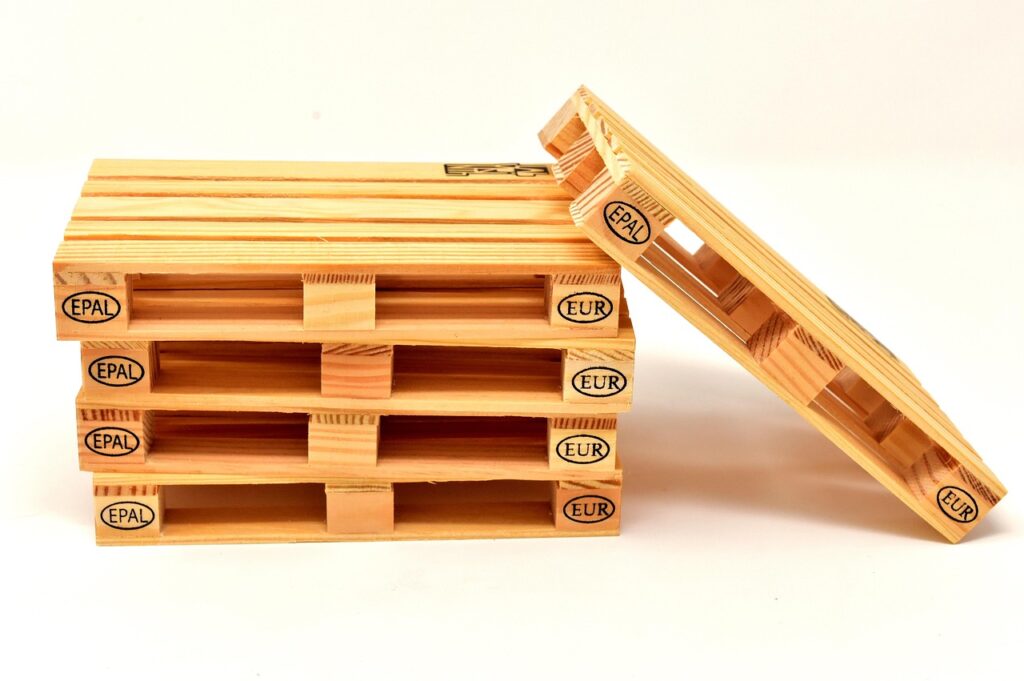Wooden pallet manufacturers specialize in producing pallets designed to meet various shipping, storage, and transportation needs. These manufacturers offer a range of standard sizes and custom options tailored to specific requirements, including weight capacity and wood type. They provide solutions that balance durability, cost-effectiveness, and environmental sustainability for businesses across industries.
Many manufacturers also focus on eco-friendly practices, offering recycled pallets and repair programs to extend pallet life. Their expertise ranges from creating light-use pallets to heavy-duty options, ensuring clients have access to products suited to their unique operational demands.
With advancements in manufacturing technology and a commitment to quality, these companies serve both local and international markets, supporting businesses in maintaining efficient supply chains with reliable pallet options.
Overview of Wooden Pallet Manufacturers
Wooden pallet manufacturers produce a variety of pallet types tailored to different industries and shipping needs. Their manufacturing processes involve specific techniques for wood treatment, assembly, and customization. Compliance with industry standards ensures safety, quality, and environmental responsibility in pallet production.
Types of Wooden Pallets Produced
Manufacturers typically produce standard pallets, which adhere to common size and load capacity requirements used worldwide.
They also create custom pallets to meet unique dimensions, weight limits, or special handling needs, often for industries like electronics, pharmaceuticals, or food.
Specialized pallets are designed for niche purposes, such as heat-treated pallets for international shipping or ergonomically optimized pallets to improve worker safety.
Pallets vary by wood type, grade, and construction method, affecting durability, weight, and cost. Many manufacturers offer recycled or refurbished options to support sustainability.
Manufacturing Processes
The process begins with selecting and preparing wood, usually softwoods or hardwoods, which are kiln-dried to reduce moisture content.
Cutting and shaping components follow precise specifications to ensure uniformity.
Nails, staples, or sometimes screws are used to assemble pallet parts, often with automated nail guns to improve efficiency.
Some manufacturers apply heat treatment or fumigation to meet international phytosanitary standards (ISPM 15).
Quality control is ongoing, including inspections for load capacity and structural integrity before packaging and shipment.
Industry Standards and Certifications
Wooden pallet manufacturers adhere to standards such as ISPM 15, which requires heat treatment or fumigation for export pallets to prevent pest spread.
Other certifications include FSC (Forest Stewardship Council) for responsible sourcing of wood and ISO standards related to quality management.
Many producers align with regional safety regulations and labeling requirements.
Certifications assure buyers of compliance with environmental, quality, and safety expectations, influencing purchasing decisions and market access.
Selecting a Wooden Pallet Manufacturer
Choosing the right wooden pallet manufacturer involves assessing factors like reliability, product quality, and environmental impact. Careful evaluation ensures pallets meet transport needs and comply with industry standards. The following points detail important aspects to consider when selecting a supplier.
Key Selection Criteria
A reputable manufacturer must have a proven track record with positive customer feedback and industry experience. Timely delivery is critical to maintaining supply chain efficiency. Customization options, such as pallet size and wood type, should be available to meet specific operational requirements.
Certification matters; pallets treated according to international standards (e.g., ISPM-15) are necessary for export and cross-border shipments. Cost-effectiveness should be balanced with durability to ensure long-term savings. Transparent communication and reliable customer support add value throughout the purchasing process.
Quality Assurance Practices
Manufacturers should implement rigorous quality control at every production stage. This includes using properly dried wood to prevent warping and damage. Pallets must be inspected for structural integrity, weight tolerance, and resistance to splinters or breakage.
Heat treatment or fumigation confirms compliance with phytosanitary regulations, especially for export pallets. Consistent manufacturing processes backed by certifications demonstrate commitment to standards. Documentation supporting these quality measures is essential for logistics and customs clearance.
Sustainability and Sourcing
Sourcing wood from responsibly managed forests helps reduce environmental impact and supports sustainability initiatives. Manufacturers adhering to certifications like FSC (Forest Stewardship Council) indicate their commitment to ethical material sourcing.
Recycled or reclaimed wood options also provide eco-friendly alternatives. Sustainable production includes minimizing waste and using low-impact preservatives or treatments. Transparent supply chains ensure customers can verify the origin of the wood and the sustainability claims made by the manufacturer.




